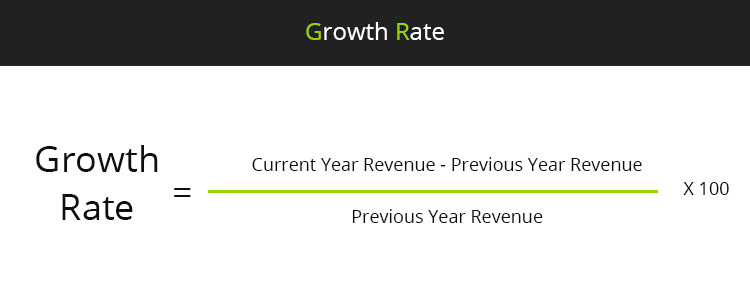By navigating this delicate balance, businesses can ensure they are on a sustainable path to long-term success without sacrificing necessary growth or financial stability.
What is the Rule of 40 (for Saas)?
In a single sentence, according to the Rule of 40, the sum of their growth speed and profit edge must be no less than 40 percent.
This rule is a standard for judging if a business has managed to grow quickly while still keeping good financial health. Remember, fast growth is important, but it shouldn’t harm profit levels.
To calculate the Rule of 40, you need to add the percentage of your company’s yearly growth in revenue with its profit margin. If it comes to 40% or more, the business is managing well between growing and making profits and is set up nicely for ongoing achievement.
But more on calculating exactly the rule of 40 a little later.
Why is the Rule of 40 Important?
This standard is essential in technology and SaaS industries (both vertical and horizontal), where companies try to get more market share quickly. What’s more, they sometimes choose to grow fast rather than make a profit right away. But this focus on growing can cause them to ignore making money, which might put their future success at risk.
Companies can choose their strategies better when they follow the Rule of 40. They have a better understanding of when to try for more growth and when to focus on making more profit.
This balance is very important for moving through the competition, helping them grow steadily and stay financially strong at the same time.
Calculating the Rule of 40
Calculating the Rule of 40 involves two key components: growth rate and profit margin. Here’s how you can calculate each of these, one by one.
Step #1: Calculating growth rate
Growth rate measures a company’s revenue increase over a specific period, typically year-over-year (YoY).
- Choose your time frame: For the Rule of 40, a year-over-year comparison is most common. Select the current year and the previous year as your comparison points.
- Find your revenues: Determine your company’s total revenue for the current year and the previous year.
- Calculate the growth rate:

This will give you the growth rate as a percentage.
Step #2: Calculating profit margin
Profit margin reflects how much of each dollar in revenue is translated into profit, indicating the company’s efficiency in converting sales into net income.
- Determine net income: Net income is your total revenue minus all expenses, taxes, and costs. Find your net income for the same period you used to calculate your growth rate.
- Use the profit margin formula:

This formula will give you the profit margin as a percentage.
Step #3: Adding them up & Interpreting results
Once you have both the growth rate and the profit margin percentages, add them together.
Above 40%: If the sum of the company’s growth rate and profit margin exceeds 40%, it is generally considered to be performing well. It indicates a healthy balance between growth and profitability, suggesting that the company is both expanding its business and managing its resources efficiently.
Exactly 40%: A result of exactly 40% is considered acceptable and indicates that the company is on the right track, maintaining an equilibrium between expanding its market presence and being profitable.
Below 40%: If the combined figure is below 40%, it might be a cause for concern. It suggests that the company may need to balance its growth and profitability effectively. Companies below this threshold may need to reassess their strategies to either stimulate growth or improve profitability.
Example
Here’s an example of a hypothetical company, to better understand how these formulas work in practice.
Previous Year Revenue: $1,000,000
Current Year Revenue: $1,200,000
Net Income for Current Year: $100,000
Growth rate = 1,200,000 – 1,000,000/ 1,000,000 x 100 = 20%
Profit margin = 100,000/ 1,200,000 x 100 = 8.33%
Rule of 40 score = 20% + 8.33% = 28.33%
In this example, the company’s Rule of 40 score would be 28.33%, indicating that it might need to either increase its growth rate, improve its profit margin, or both to meet the Rule of 40 benchmark.
Applications of the Rule of 40
The rule of 40 is more than a vanity matric; it has many applications, too.
SaaS valuation
As a metric, it’s used by investors and analysts to assess the financial performance of SaaS companies during a SaaS valuation. Companies that meet or exceed the Rule of 40 are more attractive investment opportunities.
Profitability optimization
For businesses growing quickly but not making enough profit, it is important to start working on increasing their profits. This could involve
- automating processes
- reducing customer churn
- refining pricing strategies
Balanced decision-making
The Rule of 40 supports a balanced way of making decisions, considering how each strategic action affects growth and profit. Sometimes it means not taking chances that could grow the business if they would also greatly reduce profits, or choosing to grow more slowly to make sure the company can keep making money steadily.
Rule of 40 Examples
Let’s take a look at some hypothetical examples of how some companies, from different backgrounds, apply the Rule of 40.
Example #1: Fast-Rising SaaS Startup
Background: A SaaS business providing project management software solutions has been recording amazing growth, with a 35% year-over-year revenue increase.
Challenge: Although the company showed impressive growth, its profit margins did not exceed 2%, which is quite low.
Solution: The company aimed at making its growth funnel more efficient and cutting down the customer acquisition cost. They did implement a new onboarding experience and better customer service that led to the improvement of customer lifetime value and churn rate.
Example #2: Established tech firm
Background: A well-known technology company with a developed product already selling increased its business size by 10% every year and had a strong profit rate of 35%.
Challenge: The company had to maintain its profit levels while speeding up expansion to stay competitive with new market entrants.
Solution: The business expanded the variety of products it offers and put money into strategies for growing in different markets, while closely watching how these changes affect its profit margins.
Example #3: Niche SaaS provider
Background: A specialized SaaS company presented a unique service and had dedicated customers. Its growth was 15% each year, with profits making up 30% of the earnings.
Challenge: The company sought to expand its market reach without diluting its strong profit margins.
Solution: Using its current customers, the company started a program for recommendations and concentrated on selling more expensive functions.
Limitations of the rule of 40
The rule of 40 is a valuable metric but comes with its own limitations.
1. Not one-size-fits-all
The Rule of 40 may not be suitable for every step in your company’s life or under various market situations. For example, startups at the beginning might focus more on increasing size rather than making profit, which could explain why their Rule of 40 result is much lower than the optimal level.
2. Overemphasis on short-term performance
Companies could concentrate too much on achieving the Rule of 40, neglecting important long-term strategies that might reduce growth or profit in the short term but are crucial for lasting success.
3. Risk of manipulation
Like any metric, the parts of the Rule of 40 can be changed around; how you define and measure profit can be changed. This means a company might adjust the way it calculates profit to make its overall performance seem better than it actually is. This can make it hard to truly understand how well the company is performing.
Conclusion
In conclusion, the Rule of 40 serves as a valuable growth metric benchmark for evaluating the performance of your SaaS company.
Offering a simple formula that combines revenue growth and profitability, helps not only you but also investors, managers, and stakeholders understand whether a company is striking the right balance between expansion and financial health.
Do you need help with the rule of 40, or any other growth and North Star metric?
Contact us and let’s find out how we can help you!

I write for GrowthRocks, one of the top growth hacking agencies. For some mysterious reason, I write on the internet yet I’m not a vegan, I don’t do yoga and I don’t drink smoothies.



